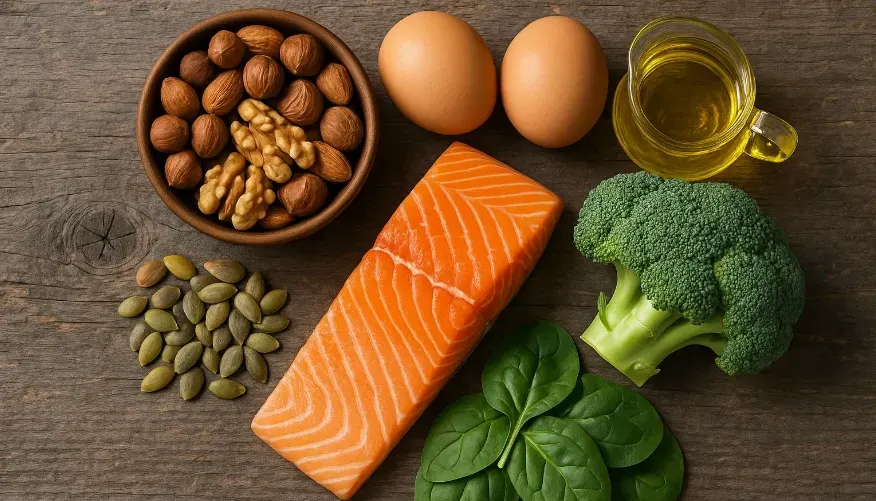Do These 5 Things to Naturally Boost Testosterone Levels
Key takeaways
- Balanced nutrition with adequate fats, protein, and micronutrients supports testosterone production.
- Maintaining a healthy body fat percentage prevents excess conversion of testosterone to estrogen.
- Quality sleep and proper recovery are essential for hormone balance.
- Alcohol, smoking, and endocrine disruptors can interfere with testosterone production and function.
Testosterone plays a vital role in muscle development, energy, libido, bone density, and overall vitality. While levels naturally decline about 1% per year after age 30, some men in their 70s maintain levels comparable to younger adults. Genetics matter, but lifestyle choices can significantly slow—or accelerate—the decline.
1. Maintain a Balanced Diet Rich in Macronutrients
Fats, Carbohydrates, and Protein
A diet deficient in healthy fats can impair hormone production since cholesterol is a building block of testosterone. Similarly, extremely low-carb diets may reduce circulating testosterone availability. Adequate protein supports muscle repair, which indirectly boosts hormone health by improving body composition.- Healthy fats: olive oil, avocados, nuts, fatty fish
- Complex carbs: whole grains, sweet potatoes, legumes
- Lean protein: poultry, eggs, beans, and grass-fed beef

Key Micronutrients
Some vitamins and minerals directly support testosterone production and function:- Zinc: involved in testicular hormone production
- Magnesium: supports bioavailable testosterone and energy metabolism
- Vitamin D: influences androgen receptor sensitivity and hormone synthesis
2. Achieve and Maintain a Healthy Body Composition
Why Body Fat Matters
Excess body fat increases aromatization, the conversion of testosterone into estrogen. This creates a misleading signal to the brain: “we have enough sex hormones,” which suppresses testosterone production even when levels are already low.
Obesity is strongly linked to hypogonadism (low testosterone), while fat loss—particularly visceral fat—has the opposite effect. Men who reduce body fat from obese levels to a leaner range (around 12–15% body fat) often experience dramatic increases in testosterone.
The Goldilocks Zone
Being too lean can also backfire. Severely low body fat, as seen in competitive bodybuilders, can reduce hormone production. The goal is balance—enough fat to sustain healthy metabolism, but not so much that estrogen conversion dominates.3. Optimize Sleep and Recovery
The Sleep-Testosterone Connection
Sleep is one of the strongest regulators of testosterone. Poor or fragmented sleep reduces the secretion of luteinizing hormone (LH), which signals the testes to produce testosterone.
Consistently getting 7–9 hours of quality sleep per night can increase testosterone significantly compared to sleep-deprived states. Even one week of restricted sleep has been shown to drop testosterone by as much as 10–15%.
Recovery and Hormone Balance
Overtraining without adequate rest raises cortisol, a stress hormone that directly opposes testosterone. Prioritize rest days, stress management, and sleep hygiene to sustain natural hormone output.4. Reduce Exposure to Endocrine Disruptors
Environmental Chemicals
Plastics, pesticides, and pollutants can act as endocrine-disrupting chemicals (EDCs), competing with natural hormones for receptor binding. While the overall impact is often exaggerated compared to obesity or poor sleep, minimizing exposure is still worthwhile.
- Use glass containers instead of microwaving plastic
- Choose stainless steel or glass water bottles
- Filter tap water where possible
- Improve air quality with ventilation or HEPA filters
The Bigger Picture
While EDCs pose risks, they are less impactful than core factors like body fat, diet, exercise, and sleep. Think of toxin reduction as a secondary strategy layered on top of the fundamentals.5. Limit Alcohol and Smoking
Alcohol’s Impact
Alcohol directly suppresses steroidogenesis (hormone production) in the testes. It also disrupts sleep, elevates oxidative stress, and promotes fat gain—all of which undermine testosterone.
The effects are dose-dependent. Some men tolerate light drinking, while others experience drops in testosterone with just a few drinks per week. Err on the side of moderation or abstinence if testosterone optimization is a goal.
Smoking and Oxidative Stress
Cigarette smoking compounds oxidative stress in the testes and damages blood vessels, impairing both testosterone output and sexual function. Quitting smoking yields significant health and hormone benefits at any age.Conclusion
Testosterone levels decline naturally with age, but lifestyle choices can strongly influence the pace. By eating a balanced diet, maintaining healthy body composition, prioritizing sleep, reducing environmental toxin exposure, and avoiding alcohol and smoking, men can support their hormone health well into later years. The key is consistency. These strategies don’t offer overnight fixes, but over weeks and months, they can add up to meaningful improvements in energy, vitality, and long-term health.References
https://pmc.ncbi.nlm.nih.gov/articles/PMC1502324/
https://pmc.ncbi.nlm.nih.gov/articles/PMC4445839/
https://pmc.ncbi.nlm.nih.gov/articles/PMC3955331/
https://pmc.ncbi.nlm.nih.gov/articles/PMC6761906/
https://pubmed.ncbi.nlm.nih.gov/8875519/
